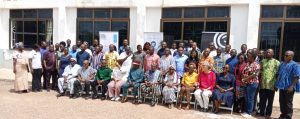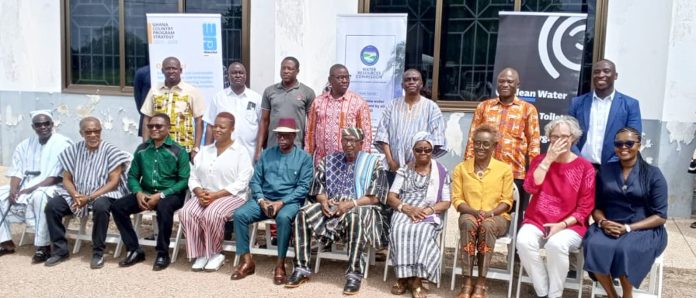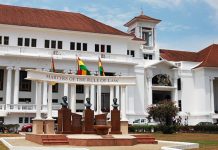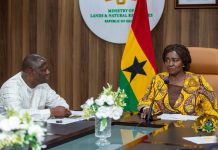WaterAid Ghana, in collaboration with the Water Resources Commission and partners, has launched the Climate Resilient Water, Sanitation and Hygiene (WASH) Financing Mechanism (CRWFM) in the Upper East Region.
The CRWFM, established under the Securing Water Access Project (SWAP) is an innovative initiative focused on addressing climate-related WASH vulnerabilities by decentralising funding and empowering local actors to drive sustainable solutions.
It aims strengthening climate resilience and improving access to WASH services in climate-vulnerable districts in the region.
Mr Richard Agbo Ntibrey, the Programme Manager for WASH and Climate at WaterAid Ghana, presenting on the CRWFM concept at the launch in Bolgatanga, explained that the mechanism would catalyse local climate action while ensuring inclusiveness.
“The driving force should be the community and this mechanism accelerates local responses to climate challenges, ensuring solutions are grassroots, inclusive and tailored to local adaptation needs,” he said.

He said the initiative placed emphasis on involving marginalised groups, including women, persons with disabilities, Village Savings and Loans Associations (VSLAs), Water and Sanitation Management Teams (WSMTs) and other community-based actors.
“By linking financial support directly to WASH, the scheme prioritises equity-driven and climate-resilient interventions,” he added.
Ing. Ntibrey emphasised that priority projects will include the development and rehabilitation of climate-resilient water infrastructure, adoption of water conservation technologies, promotion of nature-based solutions and support for climate-adaptive livelihoods.
To mark the launch, WaterAid presented GH¢400,000 as seed funding, with GH¢17,700 disbursed to the Dasabiligo WASH Committee as the first beneficiary group, having had their community plan for the rehabilitation of its dam approved.
Dr Joachim Ayiiwe Abungba, the Chairman of the White Volta Basin Watershed Fund Steering Committee, described the initiative as “one of the happiest days” for the Basin.
The Basin was established in September 2024 to strengthen governance and improve water resources management across the entire White Volta Basin.
“Since its establishment, we have been engaging stakeholders, agencies and civil society organisations to contribute to making the fund operational. And today, we are seeing part of that operationalisation come to life,” Dr Abunga said.
He emphasised: “It is open to the entire White Volta Basin, stretching to the Northern and North East Regions. Of course, districts must go through the qualification process to access it, but the fund remains open to all within the Basin.”
Dr Abunga assured that the Steering Committee and the Water Resources Commission would continue to support the process to ensure that communities and partner institutions fully benefited from the initiative.
Mrs Amaka Godfrey, the Executive Director for International Programmes at WaterAid, lauded the Dasabiligo WASH Committee for championing the initiative.
“This initiative is laudable. It’s a story I can take to the global platform to show how community-driven initiatives like this work.
“What excites me most is that this came from the community, not from WaterAid or our partners, but from the people themselves who identified how best to protect their water resources,” she said.
Mr Donatus Atanga Akamugri, the Upper East Regional Minister, lauded the initiative and described it as “a bold step in our collective pursuit of sustainable development, environmental protection, and the well-being of our people.”
He stressed that the Upper East Region was already experiencing the harsh impacts of climate change, with frequent droughts, erratic rainfall, and floods disrupting water supply and sanitation systems, and pledged the full support of the Regional Coordinating Council to provide oversight and technical assistance.
The governance framework for the CRWFM comprises an advisory board and a technical committee with representation from NGOs, government agencies and the private sector to ensure transparency, innovation and alignment with national plans such as Ghana’s Nationally Determined Contributions (NDCs) and National Adaptation Plans (NAPs).
From Gilbert Azeem Tiroog, Bolgatanga
GNA










